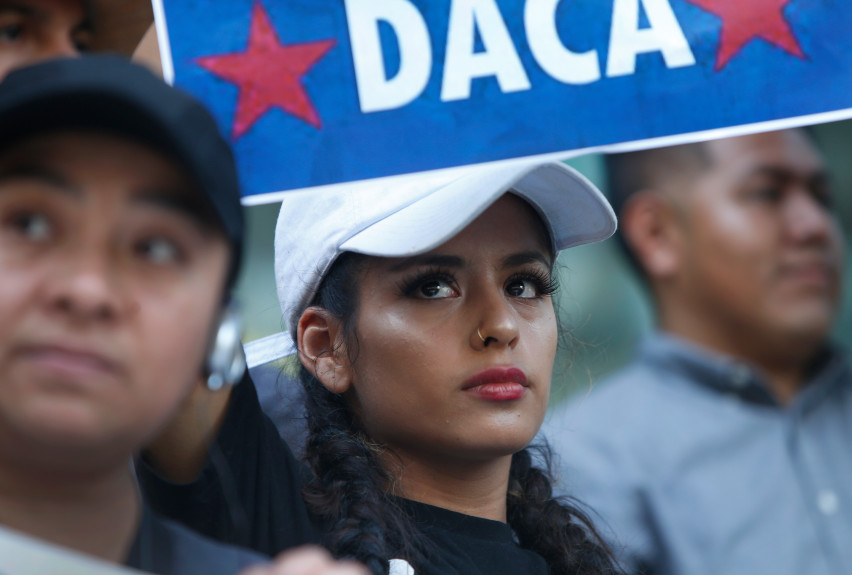Throughout California, the message to Dreamers in the wake of President Donald Trump’s plan to end deportation protection for young undocumented immigrants has been clear: We’ve got your backs.
But with the federal government’s exclusive control to enforce immigration law, it’s not clear how effective the resistance of California and other states will be.
On Wednesday, 15 states and the District of Columbia sued the U.S. government to block Trump’s plan to end Deferred Action for Childhood Arrivals program and ask Congress to come up with a solution for Dreamers within six months. California Attorney General Xavier Becerra said he plans to file a separate suit to defend the state’s 220,000 DACA recipients.
“It’s a really interesting question,” said Jessica Jenkins, an attorney for the Center for Employment Training’s immigration and citizenship program. “For the purpose of boosting morale and showing solidarity, I think it’s really great. It’s important for DACA recipients to feel supported by their communities.”
“But I do think there’s practical limitations to what that really means,” she added. “All of that is also true surrounding all of the conversations about sanctuary jurisdictions.”
The White House this week cited legal concerns about DACA, implemented by President Barack Obama in 2012, when it announced it would phase out the program. In a statement, Trump called DACA “an end-run around Congress,” which had rejected similar proposals, and noted that 10 states were threatening to sue to overturn it.
“The Attorney General of the United States, the Attorneys General of many states, and virtually all other top legal experts have advised that the program is unlawful and unconstitutional and cannot be successfully defended in court,” Trump said.
But Becerra was confident in an interview Wednesday about prospects for defending DACA in court. He called the administration’s announcement Tuesday to end DACA its latest example of “constitutional overreach,” and said it violated individuals’ rights to equal protection and due process under the law.
“There is going to be a vigorous defense of those Dreamers,” Becerra said.
The way in which the program was ended, Becerra added, might also have violated DACA recipients’ privacy rights. DACA applicants “relied on the representations of their government” about the program before turning over fingerprints and other personal information, he said, and rescinding the program is arguably a breach of that trust.
“I think the Trump administration’s track record on constitutional overreach is evident,” Becerra said. “Perhaps more powerful here is the courage and determination of the Dreamers themselves. If they can get up there and fight, I can use every tool in my disposal to fight with them.”
California Senate Republican Leader Patricia Bates declined to comment.
Like Becerra, Santa Clara County Supervisor David Cortese condemned the administration’s decision to end the program, saying it would deprive DACA recipients of government benefits — including social security accounts and health care — that they’re entitled to under the program. Cortese said the county remains steadfast in its defense of undocumented immigrants, even if it means initiating another high-stakes court battle.
Earlier this year, Santa Clara County was granted a preliminary injunction against Trump’s executive order to strip “sanctuary” jurisdictions of government funding. The county last month asked a federal court to declare Trump’s order unconstitutional in an attempt to make the injunction permanent.
“One of the reasons we’ve been successful in countering the administration’s’ initiatives with legal efforts has been because they’ve made a lot of mistakes,” said Cortese, adding that the judicial branch is “the last branch we have left.”
Reading this on your phone? Stay up to date with our free mobile app. Get it from the Apple app store or the Google Play store.
The lawsuit filed Wednesday on behalf of 15 states in federal court in Brooklyn asked a judge to strike down as unconstitutional the president’s action involving DACA. It called the move “a culmination of President Trump’s oft-stated commitments … to punish and disparage people with Mexican roots.”
Plaintiffs in the lawsuit are New York, Massachusetts, Washington, Connecticut, Delaware, District of Columbia, Hawaii, Illinois, Iowa, New Mexico, North Carolina, Oregon, Pennsylvania, Rhode Island, Vermont and Virginia.
While the administration’s decision to phase out the program isn’t necessarily unconstitutional, it may be unlawful, according to Araceli Martinez-Olguin, an immigrants’ rights attorney with Community Legal Services in East Palo Alto. Martinez-Olguin said the lawsuits springing up against the administration, “do carry a lot of weight.”
“I certainly think it’s accurate to say that the administration is acting without sufficient legal basis,” she said. “Here’s an administration that is acting capriciously. It’s making decisions without sufficient footing and without consideration for the reliance that people have put on this program.”
Of concern to advocates is the fact that the federal government has the personal information of every DACA recipient at its fingertips — and at its disposal.
But even if the government chooses to use that personal information for immigration enforcement, DACA recipients wouldn’t necessarily be a target, according to Jenkins.
“Practically speaking, there’s 800,000 DACA recipients and the government doesn’t have the resources to initiate removal proceedings against all 800,000,” she said. And even if they do, DACA recipients would have a much better chance to succeed in immigration court proceedings because aside from being educated and knowing English, they’ve been here for at least 10 years, she said.
“They’re an informed and empowered group and they know their rights.”

